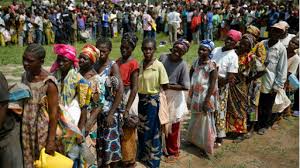Baseline Survey for Emergency Assistance to Women/Girl IDPs and other Women/Girls Survivors of Insurgency in Northern (Gombe, Adamawa and Bauchi States) Nigeria-With support of UN Women Nigeria Country Office.
The UN Women Humanitarian Strategy (2014-2017) demonstrates that the needs and vulnerabilities of women, men, girls and boys affected by crisis are distinct and often different. Therefore, addressing these needs with effective, quality programming requires incorporation of gender equality considerations across all phases of humanitarian action -including preparedness, assessment, analysis, planning and implementation.
The consequences of violent conflict in North -East Nigeria is of diverse dimensions. Apart from contributing to aggravate food insecurity and malnutrition in Nigeria and neighboring countries. It also results to destruction of infrastructure and services. With the disruption to basic services like health care, education, clean water and sanitation facilities, susceptibility to disease would be high, like the cholera outbreak in September 2015 that infected over 1,000 people in IDP camps and surrounding communities in Maiduguri. To date, IDPs have been largely served only by national authorities, who require and have requested assistance in strengthening their response capacity.
In view of the large percentage of women and children IDPs in North East Nigeria, and keeping with the overall goal of UN Women’s Humanitarian Strategy, the UN Women, with funding from the Government of Japan, implemented a one-year project titled “Mainstreaming Gender into Humanitarian Response in Nigeria”. The Baseline Survey assignment was implemented by a team of researchers which comprises of a Lead Researcher and three Research Assistants. Based on the need for the services of a Civil Society Organisations (CSO) to facilitate the research assignment at state levels, UN Women engaged the International Action Network on Small Arms (IANSA) Women Network, who carried out the assignment with the selection of the enumerators in each state. The Project was targeted at addressing IDP needs, especially for survivors of sexual and gender-based violence in (SGBV) Adamawa, Bauchi and Gombe States in the following areas:
– Strengthen emergency assistance initiatives to internally displaced women and girls and survivors of SGBV in the target areas.
– Improve the economic capacity and social rehabilitation of women and adolescent girls affected by the crisis for peaceful cohabitation in target areas.
– Strengthen humanitarian coordination mechanisms in Nigeria to ensure a more comprehensive gender-responsive approach.
As best practice, the implementation of the intervention, focused on filling critical gender gaps in the on-going humanitarian response activities are usually accompanied by systematic efforts to measure their effectiveness and understand their broader impact on beneficiaries. This approach demands proper knowledge of the existing situation in order to be able to establish the counterfactual of the programme. It is in this context that the baseline survey of the Emergency Assistance to Internally Displaced Women/Girls and Survivors of Boko Haram Terrorism Attacks in Nigeria geared towards Mainstreaming Gender into Humanitarian Response in Nigeria was commissioned in order to obtain the baseline data against set performance indicators related to addressing critical gender gaps in the on-going humanitarian response activities in North East Nigeria. The objectives of study are to:
a. Identify the number of women and girls who are currently in IDP camps and host communities in the project states (particularly escapees from Boko Haram captivity and survivors of SGBV), noting the number of those able to access services. /
b. Identify the number of women and girls who are currently in IDP camps and host communities in the project states (particularly escapees from Boko Haram captivity and survivors of SGBV), noting the number of those able to access services.
c. Identify existence/non-existence of crisis centers in the 3 project states and determine their capacity to provide holistic integrated emergency assistance to IDP women and girls, as well as survivors of SGBV
d. Ascertain and assess existing service providers of psycho-social support (individual and institutional), including the Nigeria Police and determine gaps in meeting the needs of IDP and survivors of SGBV.
e. Identify viable economic empowerment alternatives for IDP women and girls and survivors of violence and number of women and girls who currently have access to economic empowerment initiatives.
f. Identify UN agencies and other humanitarian actors/development partners on ground, interventions provided by them and gaps in meeting the needs of target


